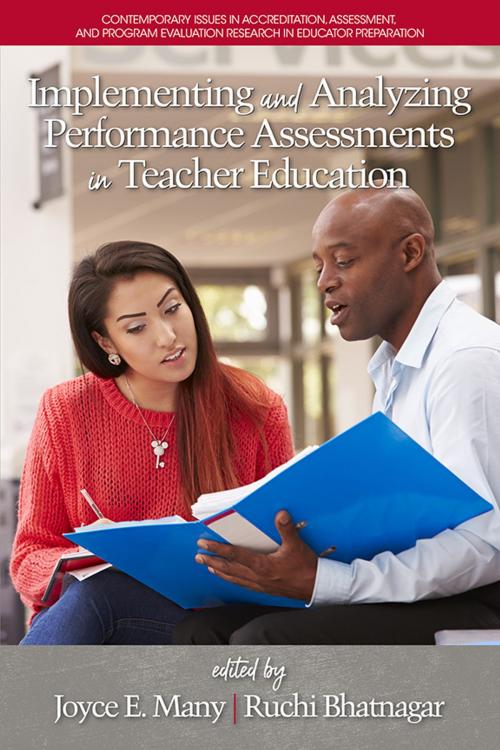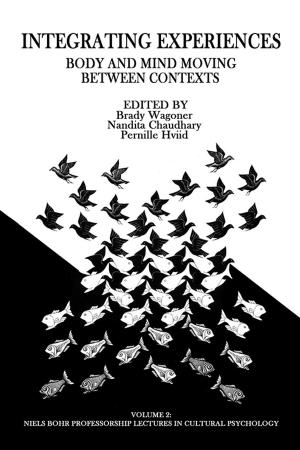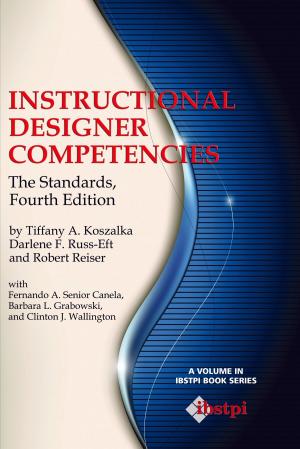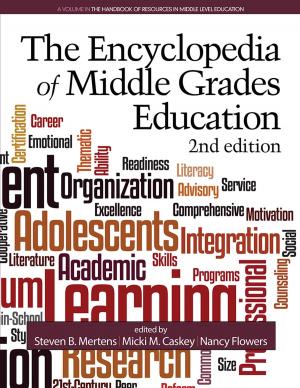Implementing and Analyzing Performance Assessments in Teacher Education
Nonfiction, Reference & Language, Education & Teaching| Author: | ISBN: | 9781641131216 | |
| Publisher: | Information Age Publishing | Publication: | December 1, 2017 |
| Imprint: | Information Age Publishing | Language: | English |
| Author: | |
| ISBN: | 9781641131216 |
| Publisher: | Information Age Publishing |
| Publication: | December 1, 2017 |
| Imprint: | Information Age Publishing |
| Language: | English |
Teacher education has long relied on locallydeveloped assessments that lack reliability and validity. Rigorous performancebased assessments for preservice teachers have been advanced as one possible way to ensure that all students receive instruction from a highquality teacher. Recently, performancebased assessments have been developed which focus on the application of knowledge of teaching and learning in a classroom setting. Our book explores factors related to the implementation of teacher performance assessments in varying state and institutional contexts. The contributors, teacher educators from across the country, focus on what was learned from inquiries conducted using diverse methodologies (quantitative, qualitative, selfstudies, and mixed methods). Their research encompassed faculty, supervisors, cooperating teachers, and students’ perceptions and concerns of teacher performance assessments, case studies of curricular reform and/or resistance, analyses of experiences and needs as a result of the adoption of such assessments, and examinations of the results of program alignment and reform. The chapters showcase experiences which occurred during highstakes situations, in implementation periods prior to highstakes adoption, and in contexts where programs adopted performance assessments as an institutional policy rather than as a result of a statewide mandate. Endorsements The chapters compiled for Implementing and Analyzing Performance Assessments in Teacher Education edited by Joyce E. Many and Ruchi Bhatnagar, present a thoughtful look at the challenges and solutions embedded in the adoption of teacher performance assessments for preservice teachers. Most chapters feature edTPA, the most commonly used performance assessment now mandated in numerous states and used voluntarily by other programs across the country, and reveal how such assessments shine a bright light on the problems of practice in teacher preparation (stressful timelines, faculty silos, communication with P12 partners, etc.) when new requirements disrupt the status quo. Each chapter tells a valuable story of performance assessment implementation and approaches that offset compliance in favor of inquiry and educative experiences for candidates and programs alike. Andrea Whittaker, Ph.D edTPA National Director Stanford University Graduate School of Education ULSCALE Many and Bhatnagar launch the AAPE book series with a curated volume highlighting the contexts in which teacher educators implement and utilize performance assessments in educator preparation. Together, the chapters present research from various viewpoints—from candidates, faculty, university supervisors, and clinical partners—using diverse methodologies and approaches. The volume contributes significantly to the program assessment research landscape by providing examples of how performance assessments inform preparation at the intersection of praxis and research, and campus and field. These chapters provide a critical foundation for teacher educators eager to leverage performance assessments to improve their programs. Diana B. Lys, EdD. Assistant Dean of Educator Preparation and Accreditation School of Education University of North Carolina at Chapel Hill
Teacher education has long relied on locallydeveloped assessments that lack reliability and validity. Rigorous performancebased assessments for preservice teachers have been advanced as one possible way to ensure that all students receive instruction from a highquality teacher. Recently, performancebased assessments have been developed which focus on the application of knowledge of teaching and learning in a classroom setting. Our book explores factors related to the implementation of teacher performance assessments in varying state and institutional contexts. The contributors, teacher educators from across the country, focus on what was learned from inquiries conducted using diverse methodologies (quantitative, qualitative, selfstudies, and mixed methods). Their research encompassed faculty, supervisors, cooperating teachers, and students’ perceptions and concerns of teacher performance assessments, case studies of curricular reform and/or resistance, analyses of experiences and needs as a result of the adoption of such assessments, and examinations of the results of program alignment and reform. The chapters showcase experiences which occurred during highstakes situations, in implementation periods prior to highstakes adoption, and in contexts where programs adopted performance assessments as an institutional policy rather than as a result of a statewide mandate. Endorsements The chapters compiled for Implementing and Analyzing Performance Assessments in Teacher Education edited by Joyce E. Many and Ruchi Bhatnagar, present a thoughtful look at the challenges and solutions embedded in the adoption of teacher performance assessments for preservice teachers. Most chapters feature edTPA, the most commonly used performance assessment now mandated in numerous states and used voluntarily by other programs across the country, and reveal how such assessments shine a bright light on the problems of practice in teacher preparation (stressful timelines, faculty silos, communication with P12 partners, etc.) when new requirements disrupt the status quo. Each chapter tells a valuable story of performance assessment implementation and approaches that offset compliance in favor of inquiry and educative experiences for candidates and programs alike. Andrea Whittaker, Ph.D edTPA National Director Stanford University Graduate School of Education ULSCALE Many and Bhatnagar launch the AAPE book series with a curated volume highlighting the contexts in which teacher educators implement and utilize performance assessments in educator preparation. Together, the chapters present research from various viewpoints—from candidates, faculty, university supervisors, and clinical partners—using diverse methodologies and approaches. The volume contributes significantly to the program assessment research landscape by providing examples of how performance assessments inform preparation at the intersection of praxis and research, and campus and field. These chapters provide a critical foundation for teacher educators eager to leverage performance assessments to improve their programs. Diana B. Lys, EdD. Assistant Dean of Educator Preparation and Accreditation School of Education University of North Carolina at Chapel Hill















